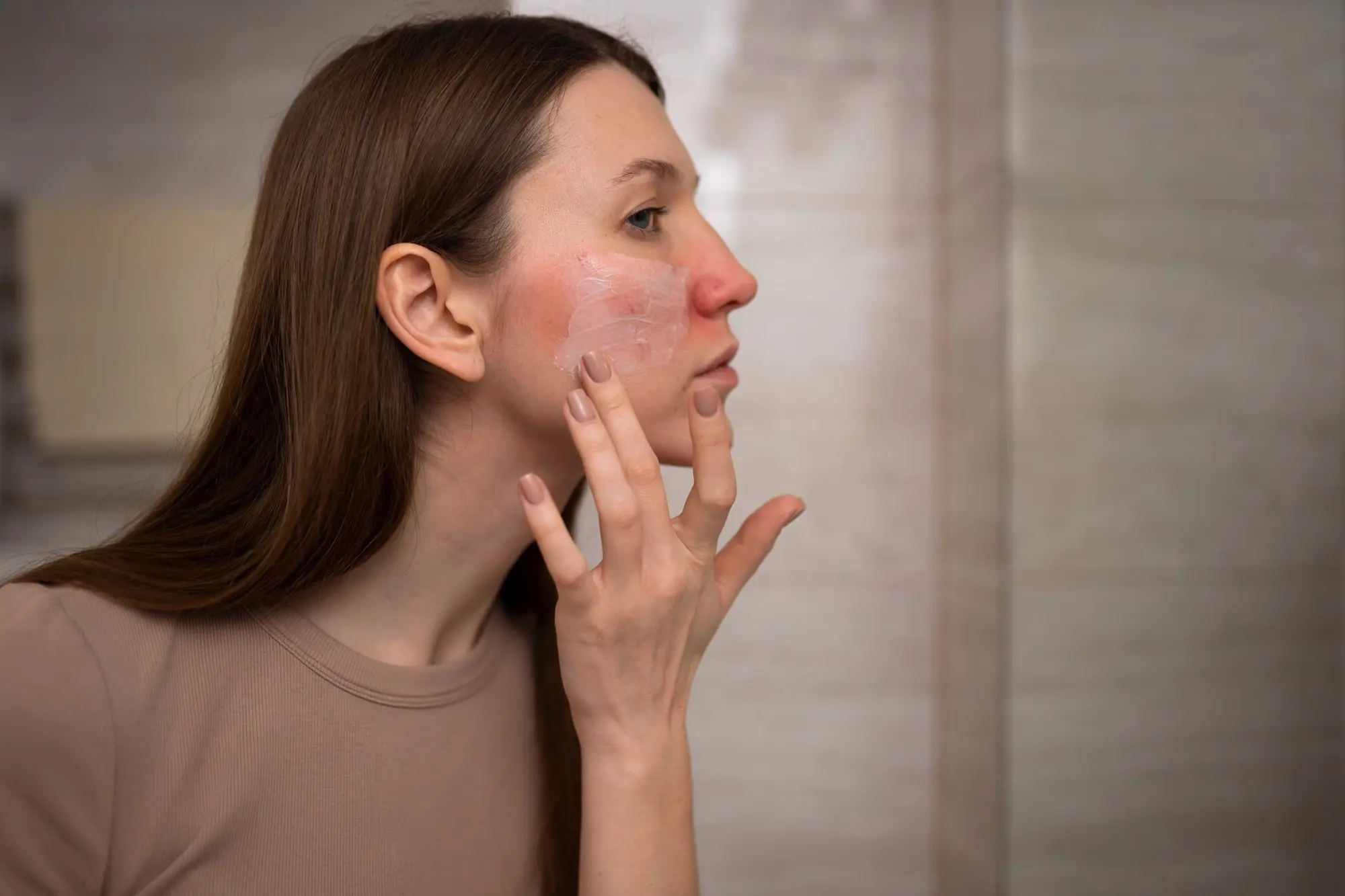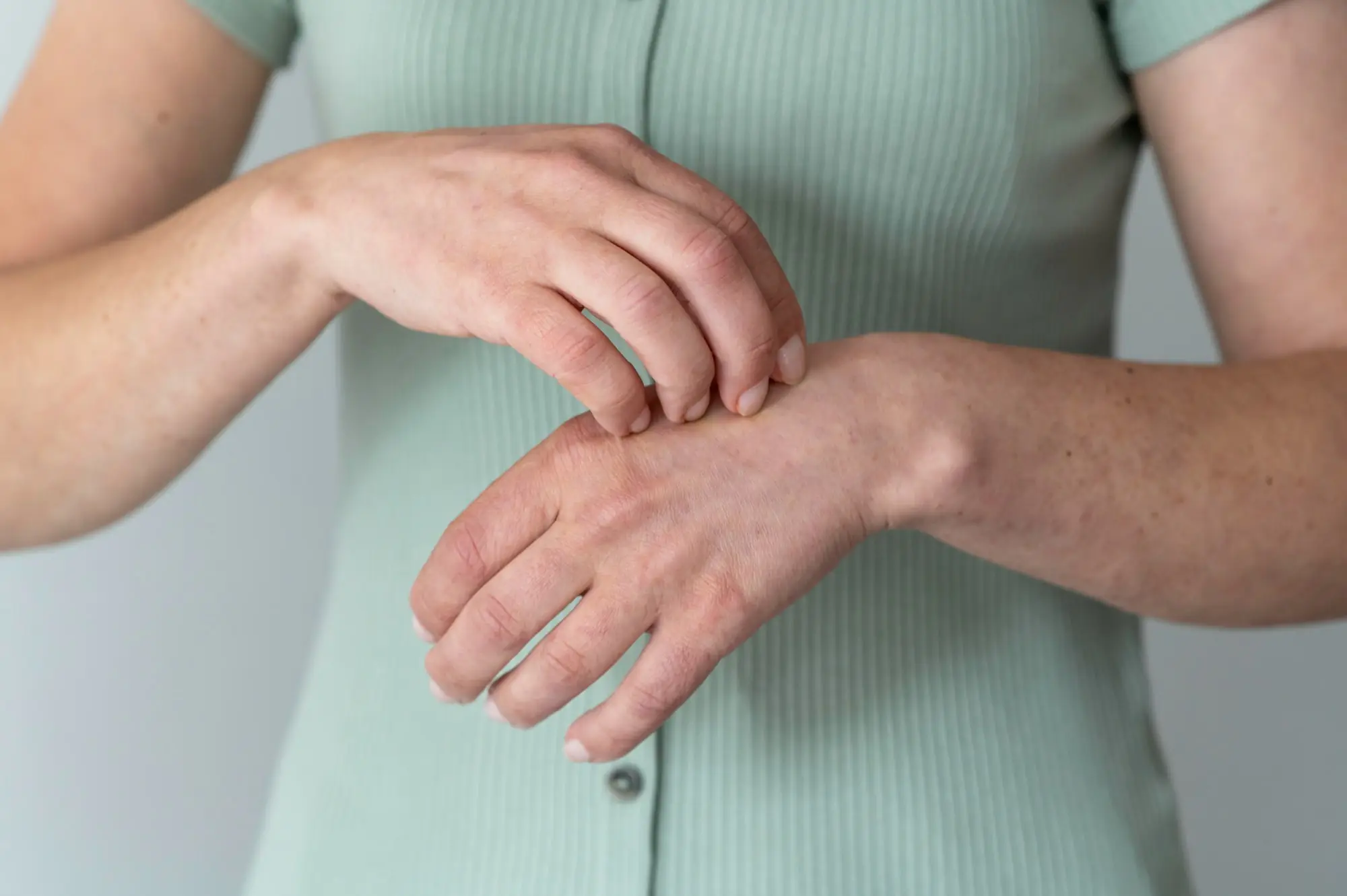
What Causes Skin Dryness? How Does Skin Dryness Pass?
Dry skin can occur for various reasons such as environmental factors, wrong care products, some health problems or genetic predisposition. Dry skin can lead to problems such as dryness and flaking of the skin. The complaint can be relieved by moisturizing, the right care products and sometimes the treatment of the underlying ailment with the support of a dermatologist.
What is Dry Skin?
Skin dryness is a condition that occurs as a result of the skin’s inability to retain enough moisture. The skin can dry out when it loses water too quickly for a variety of reasons.
What Causes Skin Dryness?
Dryness of the skin can occur due to many different reasons, and these causes are usually environmental, medical or lifestyle-related. Some factors that cause skin dryness include:
- Cold weather: During the winter months, the humidity in the air decreases, which can lead to dryness in the body. Artificial heating devices used to warm up in cold weather can also reduce moisture in the skin. Therefore, dryness and flaking of the skin become more common. In particular, symptoms such as dryness of the face and
exfoliation of the face can be seen frequently. The use of moisturizers and air humidifiers recommended by the doctor may be beneficial to prevent skin dryness during the winter months. - Taking hot water and frequent showers: Frequent showers with very hot water can eliminate the skin’s natural oils, causing it to dry out. Prolonged exposure to hot water can also reduce the skin’s moisture-holding capacity. It can cause problems such as flaking and cracking of the skin, dry hands,
and dryness of the face . - Medical conditions: Skin conditions such as atopic dermatitis, eczema, and psoriasis can cause dry skin. In addition, metabolic diseases such as diabetes and hypothyroidism can cause the skin to lose moisture. Dryness of the skin,
exfoliation and itching of the skin can be an early sign of these diseases. - Aging: As you age, your skin’s moisture-producing sebaceous glands dry out. This can also cause the oil and collagen (elasticity) in your skin to dry out, which can lead to thinning skin. With age, the water holding capacity of the skin also decreases and the skin dries out more easily. This condition can manifest itself with fine lines and flaking on the skin.
- Skin products used: Soaps, shampoos, and cleaning products that contain harsh chemicals can remove natural oils from the skin, causing dry hands and dry face. Alcohol-based skin care products can also be effective in causing skin irritation and dryness. When these products are used for a long time, flaking and cracking may occur on the skin.
- Influence of occupations: Some occupations can increase the risk of dry skin. For example, dryness of the skin can be common in occupational groups that are constantly exposed to water and chemicals, such as cooks, cleaners and hairdressers. Problems such as flaking and cracking of the skin may occur, especially on the hands. In addition, farmers, construction workers, or outdoor workers may be more prone to dry skin due to environmental factors such as cold weather and wind.
Which Vitamin Deficiency Causes Skin Dryness?
The skin needs nutrients to stay healthy. If you don’t get enough vitamin D, vitamin A, niacin, zinc, or iron, you may develop excessively dry skin. Some vitamin and mineral deficiencies that affect skin health are as follows:
- Vitamin D: Vitamin D is vital for skin health. When the body does not get enough vitamin D, problems such as dryness and irritation of the skin may occur. This vitamin helps maintain the moisture balance of the skin. Vitamin D deficiency is more common, especially in people who are not adequately exposed to sunlight. For this reason, it is important to take advantage of sunlight to get enough vitamin D and to use supplements under the supervision of a doctor if needed.
- Vitamin A: Vitamin A contributes to the regeneration of skin cells and increases the elasticity of the skin. Insufficient vitamin A intake can cause dryness, exfoliation, and irritation of the skin. This vitamin strengthens the skin’s protective barrier and helps keep the skin hydrated.
- Iron: Iron plays an important role in transporting oxygen throughout the body. Iron deficiency can lead to pallor and dryness of the skin. Insufficient oxygen can prevent skin cells from regenerating in a healthy way. Iron-rich foods include red meat, legumes, and nuts. Therefore, preventing iron deficiency can improve skin health.
- Zinc: Zinc protects skin health by reducing inflammation in the skin. Insufficient zinc intake can lead to problems such as dryness and irritation of the skin. In addition, it plays an important role in the repair process of the skin. Zinc-containing foods include seafood, meat, and whole grains. It is important to eat a balanced diet, as zinc deficiency can increase dryness on the skin.
- Niacin: Niacin is an important group of B vitamins that support skin health. This vitamin helps maintain the moisture balance of the skin and reduces dryness. Insufficient niacin intake can cause symptoms such as exfoliation and inflammation of the skin. Niacin is found in meat, fish, grains, and dairy products.

What are the Symptoms of Dry Skin?
Symptoms of dry skin are usually temporary or seasonal, unless there is an underlying health problem or regular chemical effects. Dry skin symptoms can vary depending on age, health status, skin tone, living environment, or sun exposure. Common symptoms may include:
- Itching: Skin dryness is one of the most prominent symptoms of itching. Loss of moisture in the skin can lead to stretching of the skin surface and irritation, which can cause itching. Constant itching can lead to further damage and inflammation of the skin. Itching can increase, especially at night, and this can negatively affect sleep quality.
- Rash: Dryness of the skin can often lead to the appearance of rashes. Rashes become visible with increased sensitivity on the skin and can manifest themselves in the form of red spots. These rashes can become even more uncomfortable along with itching. Such rashes on the skin indicate a weakening of the skin’s defense mechanism.
- Crusting: Skin dryness can lead to crusting on the skin. The accumulation of dead cells on the surface of the skin creates a crusty appearance and can increase the roughness of the skin. While this disrupts the healthy appearance of the skin, it can also cause aesthetic concerns.
Crusting on the skin can adversely affect the healing process of the skin and lead to more irritation. - Flaking: Skin dryness can cause signs of flaking on the skin. Reduced moisture in the skin can cause the upper layers of the skin to flak, resulting in a flaky appearance. This becomes more pronounced, especially in areas such as the face and elbows.
- Wrinkles and thinning: Skin dryness can cause the skin to lose its elasticity and wrinkles to form. Over time, the skin becomes thinner, which can accelerate the signs of aging. Dryness on the skin weakens the natural structure of the skin and negatively affects its appearance.
- Deep stretch marks: Skin dryness can cause deep stretch marks to form. These cracks occur as a result of moisture loss of the skin and are usually painful. Deep cracks can increase the risk of bleeding on the skin and make it susceptible to infections. This indicates that the skin’s protective barrier is weakened.
- Feeling of tightness: A feeling of tightness in the skin is another symptom of skin dryness. Insufficient moisture can lead to stretching of the skin surface and an uncomfortable sensation. The feeling of tightness may become more pronounced, especially after showering or in cold weather.
- Mild to severe scaling or peeling: Skin dryness can cause mild to severe scaling or peeling. The accumulation of dead cells in the skin can cause the skin to look rough and peeling. This situation can increase the feeling of discomfort on the skin and bring along the aesthetic concerns of the person. Peeling may become more pronounced, especially in areas such as the face and hands.
How Is Dry Skin Treated?
Treatment for dry skin focuses on rehydrating or restoring moisture to the skin. Some of the treatment options include:
- Using moisturizers: Doctor-recommended moisturizers are the main form of treatment for most dry skin types. It softens dry skin to help prevent cracking and works to rebuild the natural skin barrier. Moisturizing products; It is available in the form of ointments, creams, lotions and oils.
- Taking medication: For extremely dry skin that is itchy or prone to cracking, the doctor may prescribe a topical steroid that is effective for reducing swelling (inflammation) on your skin that causes a rash and itching. In severe cases, oral or injectable medications may be preferred.
- Choosing the right soap and cleaning products: It is necessary to choose the right soap and cleaning products used to prevent skin dryness. It is important to choose pH-balanced products that do not contain alcohol and parabens. Products containing harsh chemicals can increase dryness by disrupting the skin’s natural oil balance.
- Diet: Skin health depends on the nutrients in the body. It is important to include vitamins and minerals (especially vitamins A, D, zinc and iron) that increase the moisture level in the skin in the diet under the supervision of a doctor. In addition to nutrition, adequate water consumption helps moisturize the skin from the inside.
Frequently Asked Questions
What Is Good For Dry Skin?
It is very effective to regularly use a moisturizer recommended by the doctor to prevent skin dryness. Moisturizers can prevent the skin from losing water, resulting in a smoother and healthier appearance. In addition, adequate water consumption and a balanced diet containing vitamins and minerals also help to maintain the moisture balance of the skin. It is also important to avoid harsh soaps that can cause dryness and to cleanse the skin with gentle products.
What Is Dry Skin Missing?
Skin dryness is usually caused by disruption of the skin’s natural oil balance. In addition, a deficiency of nutrients such as vitamin D, vitamin A and omega-3 fatty acids can increase skin dryness. The skin’s inability to meet its moisture needs can lead to dryness and various skin problems. Insufficient water consumption is an important factor that accelerates moisture loss in the skin.
Which Vitamin is Good for Dry Skin?
While skin dryness can have many causes, the right vitamin supplement can help address this problem. Vitamins A and D play an important role in maintaining the health of the skin; Their deficiency can lead to dryness. Taking these vitamins from food or using supplements with the advice of a doctor can be good for skin dryness. However, it is necessary to consult a doctor before starting any vitamin supplements.
What Happens If Dry Skin Is Not Treated?
If left untreated, it can cause skin dryness, itching, redness, and cracks in the skin. The skin barrier may weaken and become more vulnerable to external factors. This can lead to skin infections. Long-term dryness can increase the risk of skin infections, resulting in more serious dermatological problems. In addition, this condition on the skin can negatively affect the quality of life of the person.
My face is peeling very dry, what should I do?
Excessive drying and peeling of your face can cause discomfort. First of all, adequate fluid intake and the use of moisturizer recommended by the doctor may be beneficial. Showering with warm water instead of hot water can also relieve symptoms. In addition, a doctor’s control is required to identify the underlying cause and receive appropriate treatment.
What Is Good For Dry Skin?
Dry skin is a skin problem that many people experience. Causes may include environmental factors, improper use of care products, and some skin diseases. The most effective method for dry skin is to regularly use moisturizing products recommended by the doctor. Moisturizers maintain the moisture balance of the skin and reduce dryness. In addition, adequate water intake and a balanced diet also support skin health.
What Causes Exfoliation of the Legs?
Exfoliation of the legs is often a symptom of skin dryness and occurs when the skin does not get enough moisture. Skin diseases such as eczema and psoriaris can trigger this condition. In addition, nutritional disorders, vitamin deficiencies, and side effects of certain medications can also cause this problem. Fungal infections are another cause of exfoliation of the legs.
What Causes Hand Peeling?
Hand peeling is a very common skin problem.
Bibliography
1.https://www.mayoclinic.org/diseases-conditions/dry-skin/symptoms-causes/syc-20353885 2.
https://www.mayoclinic.org/diseases-conditions/dry-skin/diagnosis-treatment/drc-20353891
3. https://my.clevelandclinic.org/health/diseases/16940-dry-skin
4.https://www.verywellhealth.com/vitamins-for-dry-skin-holistic-skincare-and-beauty-tips-5194044
https://www.healthline.com/health/dry-skin
7. https://www.hopkinsmedicine.org/health/conditions-and-diseases/dry-skin




